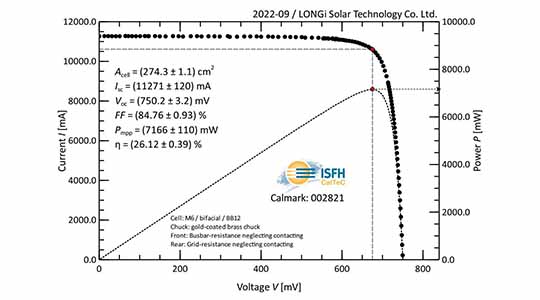LONGi has announced a new world record conversion efficiency of 26.12% for its p-type silicon heterojunction (HJT) cells. The record, validated in testing carried out by the Institute for Solar Energy Research (ISFH) in Hamelin, Germany, was achieved on full-size (M6, 274.3cm2) gallium-doped p-type monocrystalline wafers and is the highest record for p-type cell efficiency to date, further confirming the feasibility of low-cost HJT mass production technology.
The cell efficiency is 0.65% higher than that of 25.47% released earlier this year, demonstrating LONGi’s ongoing commitment to driving industrial progress via technical innovation. The LONGi R&D team has enhanced the crystal pulling process in response to increased demand for performance indicators for p-HJT wafers, such as resistivity and lifespan. The efficiency of the cell has been significantly improved in terms of short-circuit current (Isc), open-circuit voltage (Voc) and fill-factor (FF), with increases of 1.06%, 0.3%, and 1.1% respectively, due to continuous developments in interface passivation and window layer micro crystallization processes. It should be noted that the development process is similar to that for an n-type cell, fully demonstrating the technology’s versatility and reliability.
As a world-leading solar technology company, LONGi has a long-term record of delivering higher value to end users via continuous technological innovation, consolidating the company’s leading position in new solar cell technology. In 2021 alone, LONGi broke the world record for cell conversion efficiency seven times, with efficiencies for n-type TOPCon, p-type TOPCon and n-type HJT cells reaching 25.21%, 25.19% and 26.30% respectively.
For more information, visit www.longi.com











